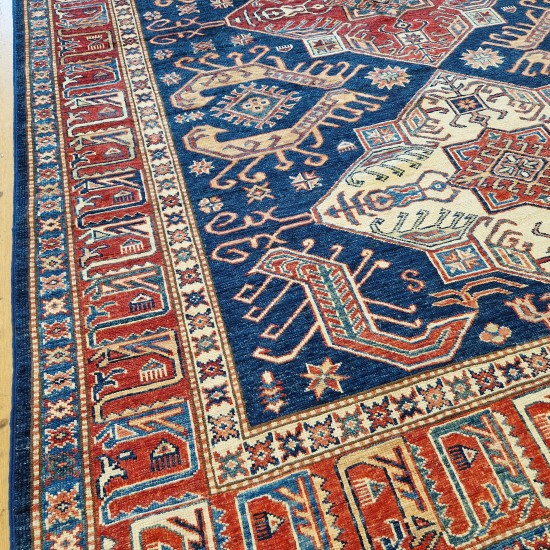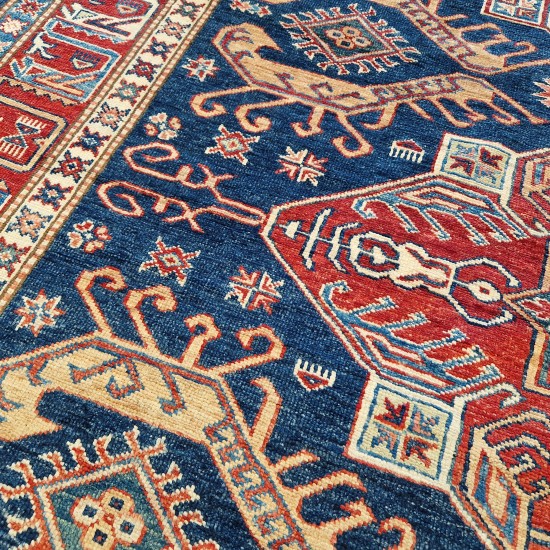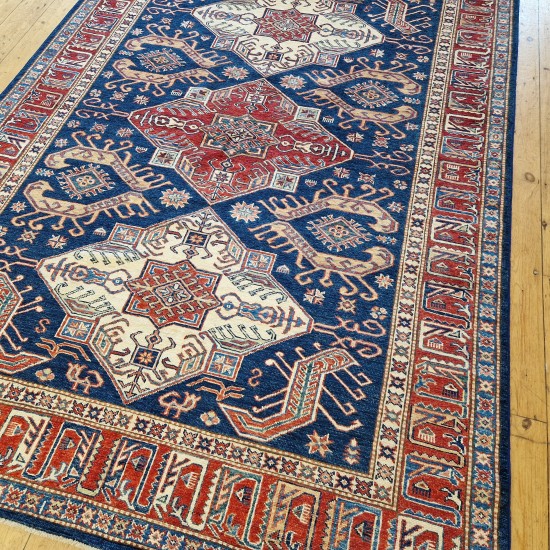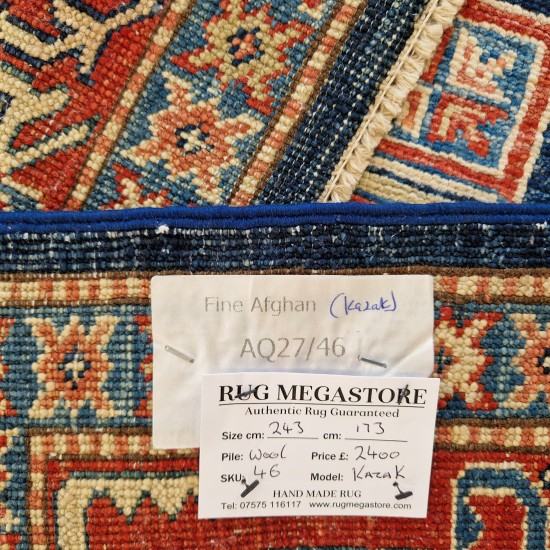Super Kazak Rug 243cm x173cm – Hand-Knotted Wool Tribal Rug














- Stock: In Stock
- Model: Kazak
- Weight: 20.00kg
- SKU: 46
14-day money Back Guarantee
100% Hand Made
Unique One of a Kind
Price Match Promise
Free Delivery to 90% of the UK
Certificate of Authenticity
Super Kazak Rug 243x173cm – Hand-Knotted Wool Tribal Rug
Bold, Traditional Afghan Kazak Rug – 243x173cm
Infuse your interior with rich cultural heritage and vivid tribal artistry with this hand-knotted Super Kazak Rug (243x173cm). Crafted by Afghan weavers using 100% hand-spun wool and natural plant-based dyes, this traditional rug features powerful geometric patterns in deep reds, blues, and cream tones. Its durable pile and timeless design make it an ideal centerpiece for both modern and classic interiors.
Product Details:
✔ Size: 243x173cm – Ideal for medium to large living rooms and dining spaces
✔ Material: 100% hand-spun wool pile, naturally dyed
✔ Construction: Hand-knotted using the Turkish (Ghiordes) knot technique
✔ Design: Classic Kazak tribal geometry with bold medallions and borders
✔ Colors: Vibrant mix of red, blue, cream, and accent tones
✔ Knot Density: Approx. 180 knots per square inch – extra fine quality
✔ Texture & Feel: Thick, plush wool pile with a rich texture underfoot
✔ Origin: Woven by master artisans in Afghanistan
✔ Condition: Brand new, authentic and one of a kind
✔ SKU: 46
✔ Price: £790
Why Choose This Kazak Rug?
✅ Authentic Craftsmanship – Traditional hand-knotting and natural materials
✅ One-of-a-Kind Artistry – No two Kazak rugs are ever the same
✅ Heirloom-Quality – Durable and made to last for generations
✅ Symbolic Design – Tribal motifs with deep cultural meanings
✅ Versatile Styling – Works beautifully in rustic, vintage, or eclectic interiors
✅ Free UK Shipping – Delivered to 90% of the UK at no extra charge
✅ Certificate of Authenticity included
✅ 14-Day Money-Back Guarantee + Price Match Promise
Order Now – Limited Availability
Make a bold design statement with this timeless Super Kazak rug. Perfect for adding warmth, colour, and cultural depth to your space. Available now for £790 with free shipping and full satisfaction guarantee.
Secure Checkout | Fast Delivery | 100% Hand Made
The Legacy Woven Into Every Kazak Rug
Kazak rugs are more than decorative pieces—they're heirlooms of history, born from the rugged highlands of the Caucasus and carried forward by generations of skilled artisans.
Rooted in the traditions of nomadic tribes from Armenia, Azerbaijan, and Georgia, and later revived in Afghanistan, each Kazak rug tells a story through bold medallions, symbolic motifs, and richly saturated natural dyes. Hand-knotted using time-honored techniques and hand-spun wool, these rugs are celebrated for their geometric clarity, cultural depth, and remarkable durability.
Today’s Afghan Kazak rugs uphold this legacy with exceptional craftsmanship. Created with vegetable-dyed wool and traditional Turkish knots, they preserve the essence of their origins while finding new purpose in modern interiors.
Whether placed in a contemporary setting or a classic room, a Kazak rug brings with it a quiet strength—an echo of tribal pride, timeless design, and the enduring beauty of the handmade.
| History Of Region | |
| Details: | The history of Kazak carpets, or Kazakh rugs, is deeply intertwined with the cultural and historical fabric of the Caucasus region, particularly within what is now modern-day Armenia, Azerbaijan, and parts of Turkey. These carpets reflect the nomadic lifestyle, traditions, and artistic expressions of the ethnic groups in this area. Historical Context Origins: Kazak carpets can trace their origins back to ancient nomadic tribes in the Caucasus mountains. The word "Kazak" itself derives from a Turkic word meaning "free man" or "adventurer," which aligns with the nomadic lifestyle of the tribes in the region. The weaving of rugs has a history that dates back several centuries, with evidence of carpet production in the Caucasus as early as the 15th century. Cultural Significance: For the nomadic peoples of the Caucasus, carpets were not merely functional objects; they were an essential part of their identity and cultural expression. Rugs served a variety of purposes, including as bedding, decoration, and for ritualistic uses. Carpets often depicted symbolic motifs and designs that represented cultural stories, values, and beliefs. Regional Characteristics: Kazak carpets are known for their bold colors and geometric patterns, showcasing tribal designs that reflect the cultural heritage of the specific tribes that produced them. Each region has its own distinct style and motifs, influenced by local traditions and the natural environment. Trade and Influence: The location of the Caucasus along trade routes facilitated the exchange of artistic techniques and patterns with neighboring cultures, including Persian and Turkish influences. This cross-cultural exchange enhanced the complexity and richness of Kazak designs over time. In the 19th century, as the region became more accessible and trade increased, Kazak carpets gained popularity in Western markets. Artisan Craftsmanship: The craftsmanship involved in creating Kazak carpets has been passed down through generations, often women from nomadic families widely known for their weaving skills. Kazak carpets are traditionally woven on horizontal looms using local wool. The weaving methods, dyeing techniques, and knotting styles contribute to the durability and allure of these carpets. Modern Era In recent times, Kazak carpets have gained international recognition for their aesthetic appeal and cultural significance. They are now sought after by collectors and interior designers for their unique designs and vibrant colors. Conclusion The history of Kazak carpets is a rich tapestry that reflects the nomadic lifestyle and cultural heritage of the Caucasus region. With their unique patterns, bold colors, and the craftsmanship involved in their creation, Kazak rugs continue to be celebrated not only as functional objects but also as pieces of art that tell the story of the people who make them. Their historical significance, combined with their beauty, makes them cherished items in homes around the world. |












